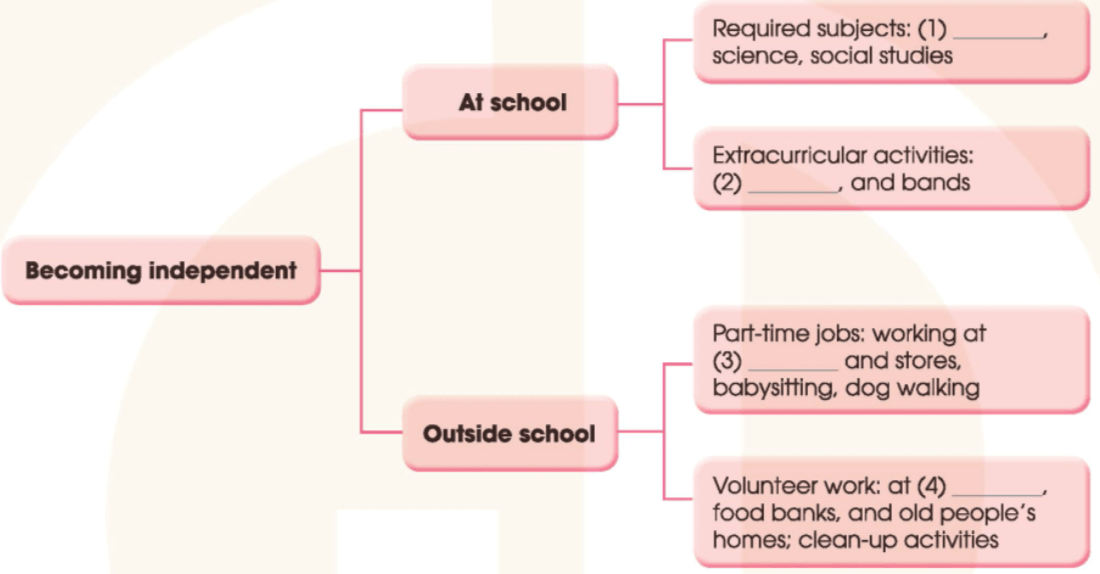Câu hỏi:
119 lượt xemWork in pairs. Use the models in 1 to make similar conversations for these situations. One of you is Student A, the other is Student B. Use the expressions below to help you. (Làm việc theo cặp. Sử dụng các mô hình trong phần 1 để thực hiện các hội thoại tương tự cho các tình huống này. Một trong số các bạn là Học sinh A, người kia là Học sinh B. Sử dụng các biểu thức dưới đây để giúp bạn)
1. Student A is going to take an exam. Student B is expressing his/her wishes for Student A’s success.
2. Student B is not feeling well. Student A is expressing his/her wishes for Student B’s recovery.
Lời giải
Hướng dẫn giải:
1.
Student A: Hi, I'm a bit nervous about the upcoming exam.
Student B: Don't worry, you got this! I know you've been studying hard and you're well-prepared. Good luck!
Student A: Thank you! I really appreciate your support.
Student B: No problem at all. Just do your best and everything will work out.
2.
Student A: Hey, how are you feeling today?
Student B: Not too great, I'm feeling a bit sick.
Student A: I'm sorry to hear that. I hope you feel better soon.
Student B: Thanks, I appreciate it.
Student A: Is there anything I can do to help?
Student B: Just your kind words and good wishes are enough to make me feel better. Thank you.
Hướng dẫn dịch:
1.
Học sinh A: Xin chào, tôi hơi lo lắng về kỳ thi sắp tới.
Học sinh B: Đừng lo lắng, bạn đã có cái này! Tôi biết bạn đã học tập chăm chỉ và bạn đã chuẩn bị tốt. Chúc may mắn!
Học sinh A: Cảm ơn bạn! Tôi thực sự đánh giá cao sự hỗ trợ của bạn.
Học sinh B: Không có vấn đề gì cả. Chỉ cần làm hết sức mình và mọi thứ sẽ diễn ra.
2.
Học sinh A: Này, hôm nay bạn cảm thấy thế nào?
Học sinh B: Không quá tốt, tôi cảm thấy hơi ốm.
Học sinh A: Tôi rất tiếc khi nghe điều đó. Tôi hy vọng bạn sẽ sớm cảm thấy tốt hơn.
Học sinh B: Cảm ơn, tôi đánh giá cao nó.
Học sinh A: Tôi có thể giúp gì được không?
Học sinh B: Chỉ cần những lời tốt đẹp và lời chúc tốt đẹp của bạn là đủ để làm cho tôi cảm thấy tốt hơn. Cảm ơn.
Everyday English
Expressing best wishes and responding
Listen and complete the conversations with the expressions in the box. Then practise them in pairs. (Nghe và hoàn thành các cuộc hội thoại với các biểu thức trong hộp. Sau đó thực hành chúng theo cặp)
Bài nghe:
A. Same to you
B. Have a great time
C. Happy New Year
D. Thanks so much
1. Nam: Hey, I heard that you‘re going on a trip to Singapore tomorrow. (1) ___________!
Mike: Yep. (2) __________.
2. Kevin: Hi, Mai. (3) __________! Wishing you a great year ahead!
Mai: Thanks, Kevin. (4) _________! Hope all your dreams come true!

